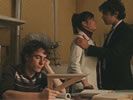Eye For Film >> Movies >> My Brother Is An Only Child (2007) Film Review
Ever since Cain and Abel realised they didn’t really get on all that well, sibling rivalry has been the source of some of the greatest stories ever told – particularly in the cinema.
The Godfather, Raging Bull, East Of Eden – all have at their heart the peculiar tensions that arise from realising that although you may love your brother like a brother, you can’t stand him as a person. It’s a classic conflict, lending itself naturally to intense two-handers if you can get the right actors – and the best directors can use it as a metaphor for the social and political divisions of the society where the story is set.

Luchetti does a pretty good job on both counts here, and if his film never quite reaches the illustrious heights of the movies mentioned above, it’s still a tough, compelling tale of just how unhappy families can get, given the wrong circumstances.
It opens in fairly conventional ‘Italian Heritage Cinema’ style; the sun is shining on an early Sixties small town and an older, wiser narrator is looking back at his teenage self boarding the bus that will take him to a new life at a Catholic seminary.
The narrator is Accio, younger of two brothers in a poor but hard-working blue-collar family, one of many in a community dominated by the Church and the local factory. But the first hint that this won’t simply be an exercise in sepia-tinted nostalgia comes when we realise that none of the rest of the family have come to see him off – apart from Manrico, his handsome and charming older brother.
It soon becomes apparent that Accio is a troubled child and his parents don’t know what to do with him. Intelligent but not academic, combining sensitivity with intense aggression and an unfocused rage and discontent with the world, he finds his fellow pupils (and even the teachers) at the seminary can’t match his devotion to the faith – and his only contact with his family are visits from Manrico, an atheist already flirting with left-wing politics, who mocks his beliefs and constantly tries to overturn them.
Eventually Accio is expelled and returns to his already overcrowded home, drifting into a menial job helping out a local market trader – who’s also a local bigwig in the still very much active Fascist party.
Accio finds the black-and-white convictions of the fascisti an ideal substitute for his lapsed faith, as well as affording plenty of opportunities for a good scrap. But Manrico has journeyed equally far in the opposite direction, a card-carrying Communist who has joined his dad at the factory, but is constantly agitating against the owner and Italian society in general.
The brothers grow up sparring verbally and physically in a manner that makes Noel and Liam Gallagher look like a pair of Buddhist monks. Accio is torn between his love for his brother and his hatred for his cause, not helped by the fact that Manrico is the apple of his parents’ eye. As the Sixties turn into the Seventies the Fascist-Communist conflict becomes ever more violent and both brothers face hard choices. And when Accio falls in love with Manrico’s fellow-activist Francesca (Diane Fleri) things get really complicated...
Such a film rests heavily on the two protagonists, of course, and here Luchetti has really struck gold. Elio Germano is a commanding screen presence; lean, intense and handsome in an off-kilter kind of way, he’s a very believable ball of tension, a rebel with way too many causes and desperately in need of understanding and affection from someone. Riccardo Scamarcio is the ideal foil for his anger. A rising star and media heartthrob in Italy, he’s also a damn good actor, conveying effortless charm and charisma, but also a darker, selfish egotism.
Every time they share the screen they strike sparks, constantly testing and challenging each other even on the rare occasions when they’re on relatively good terms. But it’s clear that their childhood bond remains.
The supporting cast are excellent too. As their father Massimo Popolizio conveys a simple, heroic dignity that calls to mind the working-class heroes of classics like The Bicycle Thieves. And Angela Finocchiario is a study of exasperated love as their mum, despairing of their political posturing and voting only for the party that promises the family a new house. Some of the other characters are a little stereotyped (seductive older woman, brilliant but cowardly minor academic) and the narration sometimes loses focus. But it sparks back into life whenever the Brothers Grim return.
Luchetti vividly conveys a down at heel Italy, beaten and worn down by war and depression. The brothers’ town is one of crumbling buildings and empty squares, miles away from the glamour and beauty of the cities. He’s equally good at conjuring up a picture of a society not too far in the past, but where the attitude to political activism is straight from the Twenties; here joining a party is not about setting up a stall in the high street every Saturday, but breaking heads, throwing firebombs – and sometimes worse...
The climax is taught, moving and tragic. But the film’s final note is uplifting, suggesting that while not everything in Accio’s garden is rosy, he has managed to find maturity and a sense of purpose. The film arrives in Britain garlanded with awards from the European festival circuit, but it’s far from being a heavy, talky piece. The rumbles between the young tearaway activists have the bottle-in-the face directness and power of Quadrophenia and Luchetti creates an epic feel despite the claustrophobic setting and short running time. Italian cinema has always told these kind of stories well and “My Brother...” is another fine example.
Reviewed on: 11 Mar 2008




















